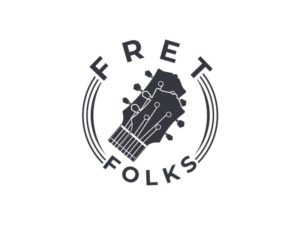In this article, I’m going to break down what ukuleles are made of and whether or not they are vegan (or can be made to be).
As a former vegan myself, I understand the struggle of scouring labels to determine if any animal products have snuck in. I’m happy to do the work for you this time!
Are Most Ukuleles Vegan?
Most ukuleles are vegan! Higher end and vintage instruments are more likely to contain animal products like nacre, bone, and hide glue. Less expensive ukes typically use synthetic materials and are vegan. Know what to look for in the specs, consider custom builds, and always check with the manufacturer to be sure.
Let’s take a look at the main components of ukuleles and dive deeper into their make-up.
Common Ukulele Components (And What They’re Made Of)
1. Body and Neck
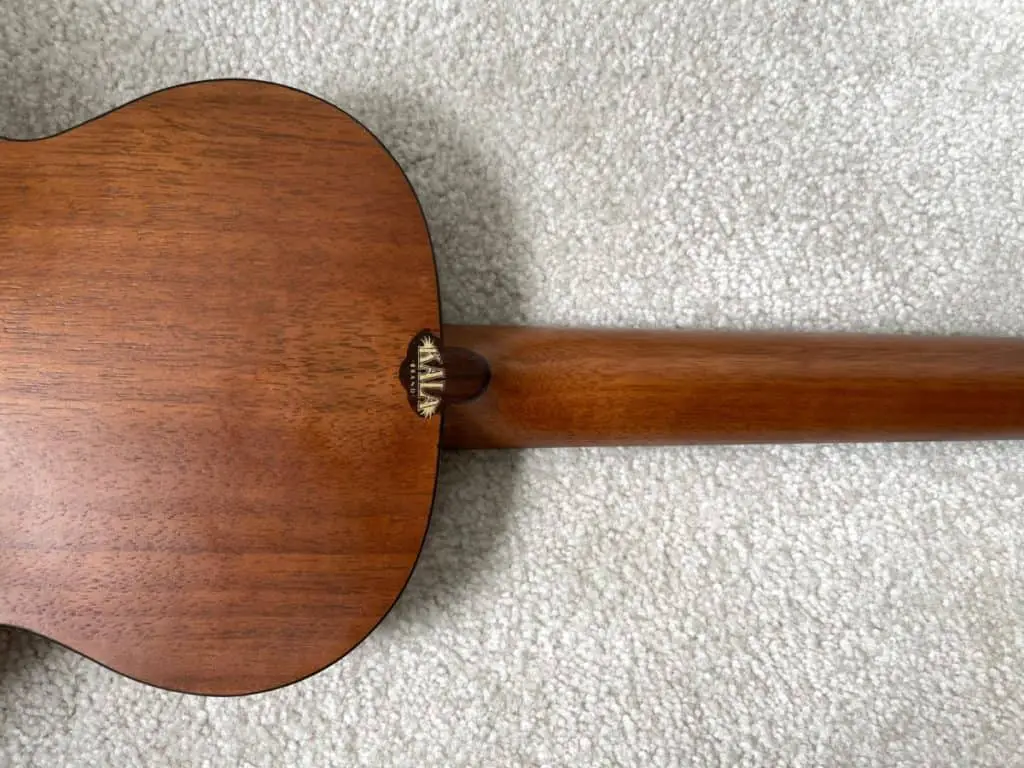
The main parts of the ukulele body – the back, sides, top, neck, headstock, fretboard, bridge, and internal bracing – are all typically made of wood, which is vegan.
Other materials commonly used for ukulele bodies include plastic and carbon fiber, both of which are devoid of animal products.
You may come across a uke featuring Richlite, most often on the fretboard. This is composed of recycled paper and resin and is also vegan.
2. Glue
Ukuleles are held together with powerful adhesives. Many ukes also feature laminate tops, which consist of several thin pieces of wood glued together.
Glue is a major component of your ukulele! But specifications rarely list what kind is used, which is an important consideration for vegans.
Synthetic glues are the most practical and commercially available for factories. This means that most ukes are assembled using epoxies, polyvinyl acetate (PVA), cyanoacrylates, or aliphatic resin glues, all of which are man-made and vegan.
If you purchase a lower end to mid-range ukulele, you can be pretty certain that the glue used is vegan even if it isn’t listed in the specs.
But if you are considering a higher end instrument, be on the look-out for hide glue, which is produced using the connective tissues of horses, fish, rabbits, and other animals.
Hide glue is harder to work with but improves tone and is more flexible. Many traditionalist luthiers prefer it for these reasons.
Historically, hide glue was the only adhesive available for instrument-making. Vintage instruments are therefore not vegan.
These days, hide glue is not as common as synthetic glue and when it is used, it is touted as a major selling point which makes it easier to spot in specifications.
You’ll often have to contact the manufacturer directly if you want to be certain what glue was used.
3. Finish
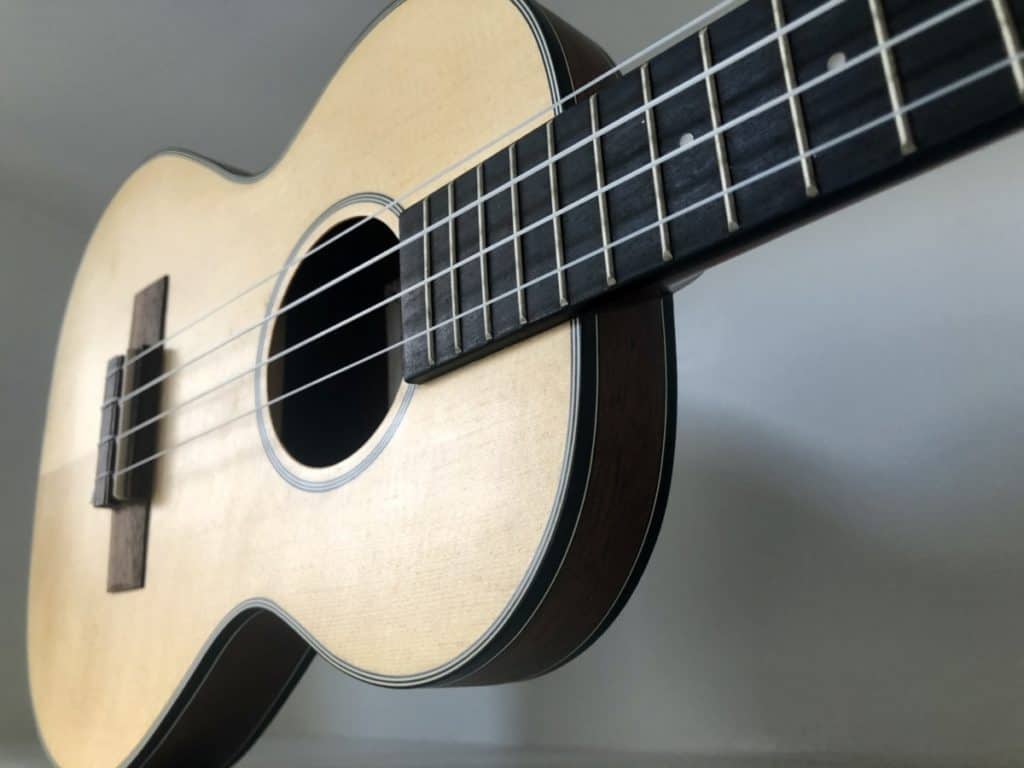
The wood surfaces of many ukuleles are finished to protect them from damage and to give them a glossy appearance.
Most modern ukes are finished with polyurethane, polyester, botanical oils, or nitro-cellulose lacquer (made from cotton) – all of which are vegan.
While it is less common, you’ll want to watch out for shellac which is made from secretions of the female lac insect. Although it’s a byproduct, many lac bugs and their eggs are killed during the harvesting process.
4. Inlays, Markers, and Decorations
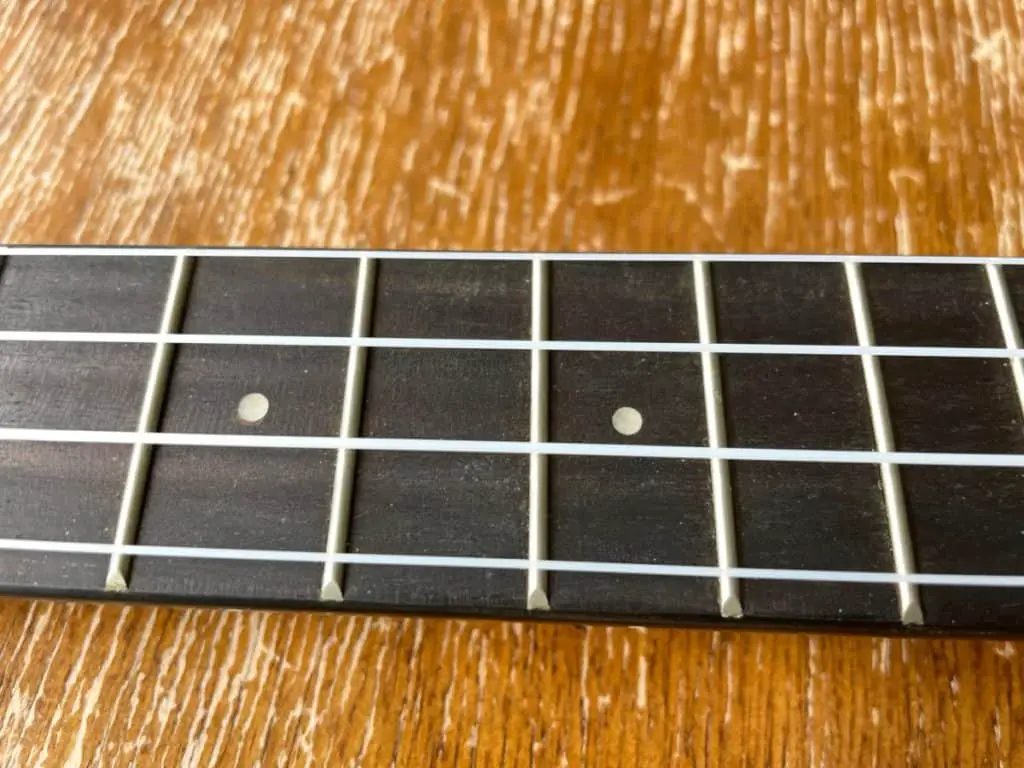
Many ukuleles feature decorative inlays on the fretboard, around the sound hole, in the purfling and binding around the edges, on the neck marker dots, on the headstock, and sometimes on the body itself.
On cheaper ukes, these decorations are typically made of plastics, acrylic resins, celluloid nitrate, polymer and clay mixtures, or even stickers which are all vegan-friendly.
Unfortunately, the most popular inlay material, especially on higher end ukes, is nacre from shells and pearls.
Nacre is produced by mollusks and snails and is therefore animal-derived. While shells can be scavenged, these creatures are typically killed to obtain the material.
When perusing specifications, watch for the use of abalone, Haliotis, mother-of-pearl (MOP), and paua. These are all terms for genuine nacre materials and are not vegan.
Pearloid is an inorganic synthetic that replicates the iridescent allure of nacre. Clay, gemstones, wood, crushed glass, and epoxy can also add cruelty-free flair.
Tortoiseshell, made from the calico shells of turtles and tortoises, was historically used for décor on vintage instruments. Modern tortoiseshell is made of plastic and cellulose acetate and is vegan.
5. Tuners
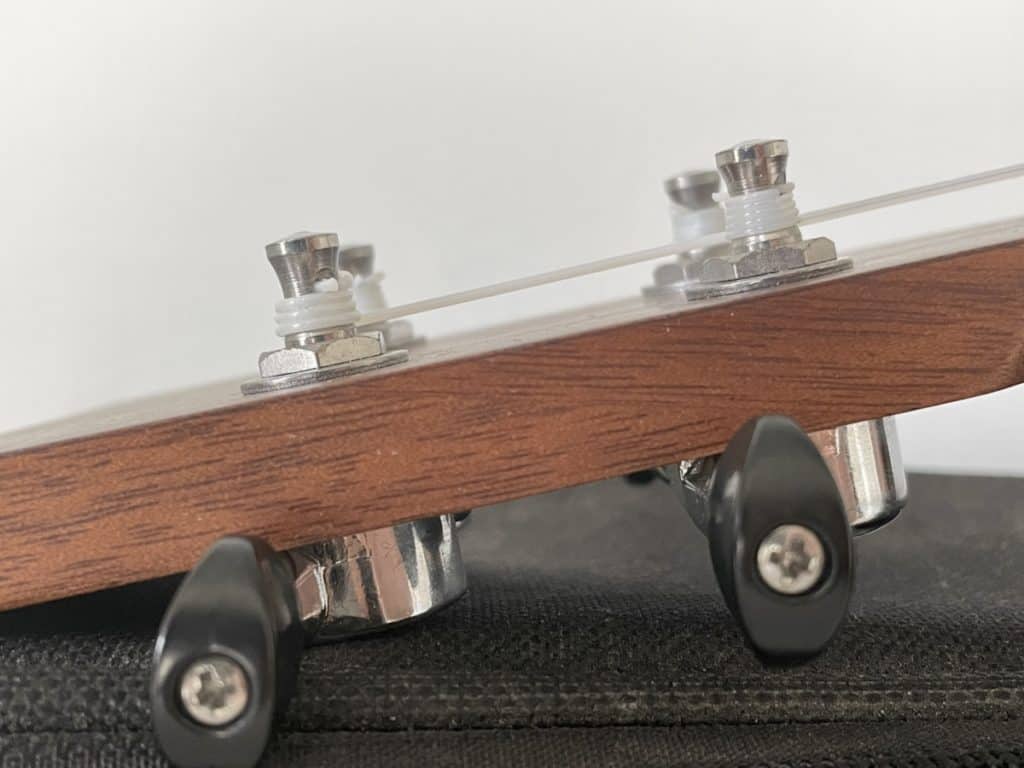
Tuners refer to the geared mechanisms in the headstock that hold the strings and allow you to tune your ukulele.
Tuning pegs used to be made of wood or bone as that was what was most available.
Modern tuners are mainly made out of metal or plastic and are therefore fully vegan. Unless you’re shopping for a vintage instrument, you shouldn’t run into any problems finding animal-free options.
6. Nut and Saddle
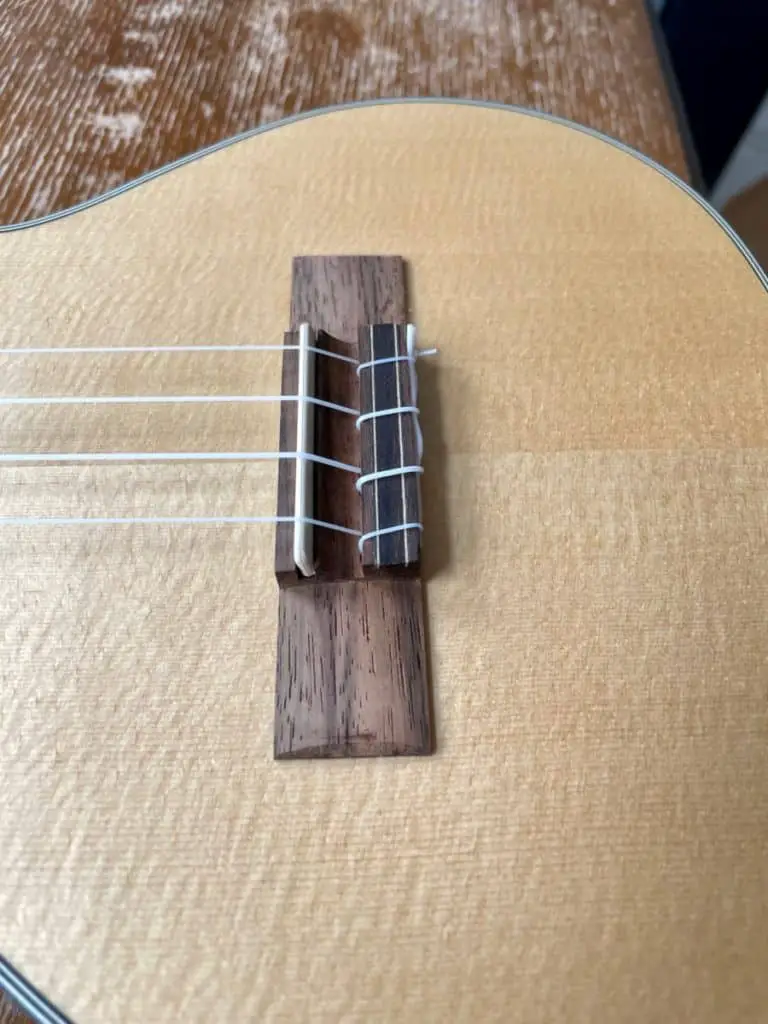
The nut, which occurs where the fretboard joins the headstock, and the saddle, which rests on top of the bridge, both hold the strings and are typically made of the same material.
In the early days of ukulele-building, bone and ivory were commonly used to make nuts and saddles.
Bone (typically from cow legs) and ivory (from elephant tusks and on occasion fossilized wooly mammoth tusks) are still used on higher end instruments for their sustain.
These days, nuts and saddles are predominantly made of plastic, acrylic resin, metal, or specialized synthetic materials like NuBone, Micarta, Corian, Ivoroid, or Graph Tech TUSQ, especially on lower to mid-range ukes.
In fact, TUSQ, a man-made imitation ivory, provides the tonal qualities of ivory without nature’s imperfections and is now preferred on many high-end instruments.
Luckily, ukulele specifications are pretty good about listing nut and saddle materials. Just remember that FMI really does stand for Fossilized Mammoth Ivory and it’s not just a joke that’s gone too far!
Strings
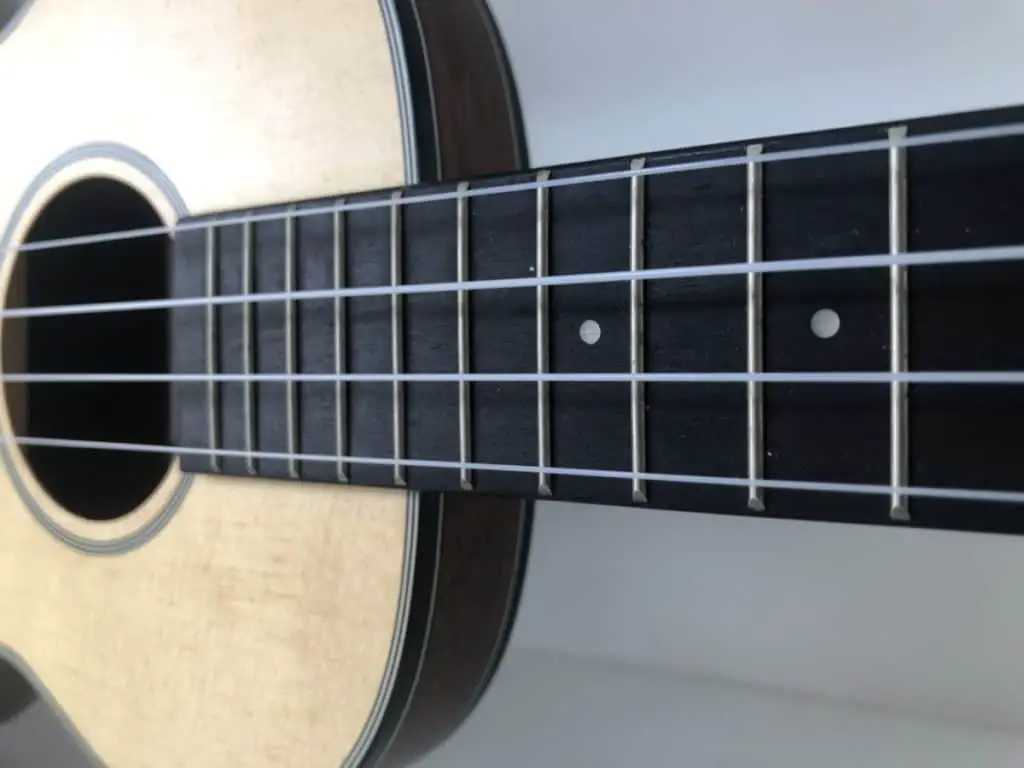
Most ukulele strings are vegan. Fluorocarbon, nylon, and Nyltech/Nylgut are all made without any animal products.
Watch out for old-fashioned gut strings, which are still produced as some players prefer that vintage tone.
Gut strings, also called cat gut strings, are produced from the dried intestines of sheep and cows and sometimes also include silk, which is produced by insects.
While these strings are rarely encountered unless you are specifically looking for them, they are definitely not vegan.
Strap Button Washers
Some ukuleles come with strap buttons on the heel, the bottom of the body, or both. There may also be a fabric disk between the button and body of the ukulele, which protects it from chafing.
Strap button washers are typically made of felt, which is likely not vegan as it usually contains a blend of synthetic fibers and wool.
It is easy enough to see if a felt washer is present and this will mostly be a concern on more expensive wood-bodied ukes. Plastic and carbon fiber ukuleles rarely use them.
You can also opt for a uke without strap buttons to avoid the dilemma.
Pick-ups and Knobs (Electric Ukes Only)
If you are planning on purchasing an electric uke, there are a few extra considerations.
Pick-ups are sometimes dipped in beeswax to reduce unwanted vibrations in a process called wax potting.
Alternative vegan materials like paraffin wax, epoxy, and silicon can be used, but this will require a conversation with the manufacturer as this process is rarely disclosed in the specifications.
The knobs on electric ukuleles are typically metal, plastic, or pearloid but on rare occasions can feature nacre so make sure to double check the specs.
Which Ukuleles Are Vegan
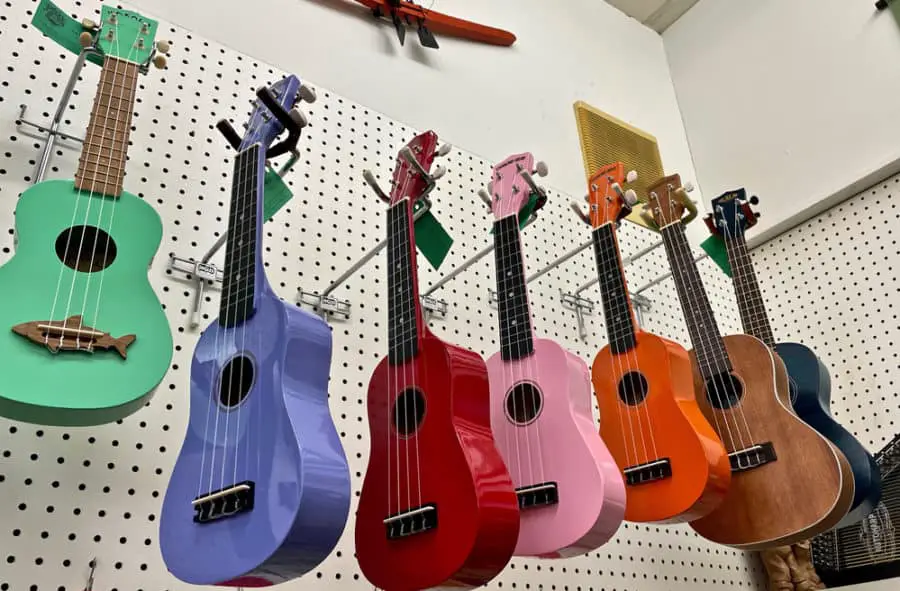
Inexpensive Ukes
Most lower to mid-range ukuleles are vegan by design! Double-check the specifications for nacre decorations which is the most common animal product used. And always contact the manufacturer to be certain.
Carbon Fiber and Plastic Ukes
Ukuleles that feature carbon fiber or plastic construction always use synthetic glues, usually lack inlay and finish, and often include the nut and saddle in their unified bodies. For these reasons, you can be certain you are buying a vegan instrument.
Great affordable options include:
- Enya Nova U (https://www.enya-music.com/collections/ukulele/products/nova-u-carbon-black)
- Outdoor Ukulele (https://www.outdoorukulele.com/collections/ukuleles/products/outdoor-ukulele-soprano-moonshine-nickel)
- Lava U (https://www.lavamusic.com/shop?g_id=5&utm_source=GG_Pmax_WL&utm_medium=Pmax&utm_campaign=GG_Pmax_US_WL_0111&utm_content=GooglePmax_WL&gclid=CjwKCAjwxOCRBhA8EiwA0X8hi6i3yml5bepQG1YSS6XhVfzFY63ldOlciIeufS_c869bbXfq8a5kWRoCe54QAvD_BwE)
- Kala Waterman (https://kalabrand.com/collections/the-waterman/products/ka-cwb-gn)
- Flight Travel series (https://flightmusic.com/travel-series/)
Innovative Ukes
Blackbird is a San Franciscan company that focuses on forward-thinking eco-conscious construction.
The Clara and Farallon ukulele models are made of Ekoa, a plant-based biocomposite, and feature Graph Tech nuts and Micarta saddles.
Check them out here: https://www.blackbirdguitar.com/collections/ukuleles
These are on the pricier side but you can be sure you are supporting ethical initiatives.
Custom Ukes
If you want to guarantee a fully vegan build, consider ordering a custom ukulele. Italian luthier Marco Todeschini intentionally crafts vegan ukuleles for his clients.
Take a look at his work here: https://www.anticaukuleleria.com/
Conclusion
Oddly enough, the cheaper the ukulele the more likely it is to be vegan.
Animal products like nacre, bone, hide glue, and shellac are more often found on higher end and vintage instruments. Less expensive factory-produced ukes use synthetic materials and are therefore vegan.
Always check the specs and contact the manufacturer to be sure and consider a carbon fiber or custom ukulele for extra peace of mind.
